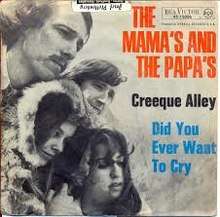Creeque Alley
“Creeque Alley” is an autobiographical hit single written by John Phillips and Michelle Phillips of The Mamas & the Papas in 1967, narrating the story of how the group was formed, and its early years. The third song on the album Deliver, it peaked at #5 on the U.S. Billboard pop singles chart the week of Memorial Day 1967.[1] It made #9 on the UK charts,[2] and #4 on the Australian and Canadian charts.[3]
| "Creeque Alley" | ||||
|---|---|---|---|---|
 | ||||
| Single by The Mamas & the Papas | ||||
| from the album The Mamas & The Papas Deliver | ||||
| B-side | "Did You Ever Want to Cry" | |||
| Released | April 1967 | |||
| Recorded | Autumn 1966, Western Recorders, Hollywood, CA | |||
| Genre | Pop, Rock | |||
| Length | 3:45 | |||
| Label | Dunhill | |||
| Songwriter(s) | John Phillips, Michelle Phillips | |||
| Producer(s) | Lou Adler | |||
| The Mamas & the Papas singles chronology | ||||
| ||||
Background
Title reference
The title of the song, which does not occur in the lyrics, is derived from Creque or Crequi (pronounced "creaky")[4] Alley,[5] home to a club in the Virgin Islands where John and Michelle Phillips' original group, the New Journeymen, spent time on vacation.[6] The lyric "Greasin' on American Express cards" harks back to that time, during which they could only make ends meet by using their American Express cards,[7] and the lyric "Duffy's good vibrations, and our imaginations, can't go on indefinitely" refers to Hugh Duffy, the owner of the club on Creeque Alley. Duffy later owned Chez Shack in Vieques, Puerto Rico.[8]
Lyrics: Name-dropping
The lyrics of the song also mention, directly or indirectly, many artists and bands who were part of the folk music scene at the time, including the other two members of The Mamas & the Papas, Cass Elliot and Denny Doherty, who were members of The Mugwumps, as well as Zal Yanovsky and John Sebastian (of The Lovin' Spoonful), Roger McGuinn (of The Byrds), and Barry McGuire (of The New Christy Minstrels). Several locations important to The Mamas and The Papas' story are also mentioned, for example the Night Owl Cafe in Greenwich Village. Michelle is referred to in the lyrics by her nickname "Michi" ("John and Michi were getting kind of itchy, just to leave the folk music behind"). John Phillips said that he wrote the song to tell Lou Adler "who was who" in their band's history.[9]
Lyrics: Turn-around
The repeated line that ends the first three verses, "No one's getting fat, 'cept Mama Cass" (Elliot was making the most money), is modified in the fourth verse to "Everybody's getting fat, 'cept Mama Cass" . The final lyric line, "And California Dreamin' is becoming a reality", is an apparent reference to their hit song "California Dreamin'", and marks the point at which the group achieved its breakthrough, leaving behind the lifestyle described in the rest of the song.
Versions
There are three mixes of the song, all with audible differences. The original single version includes a horn section which is not heard on the album versions, and ends with Doherty singing an extra "becoming a reality." The mix that appears on the mono pressings of The Mamas and the Papas Deliver omits the horns completely. It contains the repeat of "becoming a reality" but, unlike on the single, Elliot can be heard singing in harmony with Doherty. The song as heard on stereo copies of The Mamas and the Papas Deliver, as well as on almost all Mamas and Papas compilations, also omits the horns, and the extra "becoming a reality" is not heard either, save for the "-ty" syllable of "reality" (sung by both Doherty and Elliot.) The middle flute solo is also mixed differently in each version.
Chart history
Weekly charts
|
Year-end charts
|
References
- "Billboard Hot 100". Billboard. Vol. 79 no. 22. Nielsen Company. 1967. p. 20. Retrieved 30 May 2011.
- "Official Charts Company". Officialcharts.com. 1967-08-01. Retrieved 2019-07-11.
- "Archived copy". Archived from the original on 2016-09-19. Retrieved 2016-05-26.CS1 maint: archived copy as title (link)
- Laredo, Joseph F. (1998). THE MAMAS and THE PAPAS: GREATEST HITS (CD liner). MCA Records, Inc. p. 5.
- Charles Washington Baird. History of the Huguenot Emigration to America. Books.google.com. p. 209. Retrieved 2016-09-30.
- "How it All Got Started". California Dreamin' with the Mamas and the Papas. Retrieved 2014-02-14.
- "Creeque Alley". Songfacts.com. Retrieved 2009-03-14.
- "Hidden Secrets on the Island of Vieques". travelandleisure.com. Retrieved 2014-02-14.
- Gilliland, John (1969). "Show 33 - Revolt of the Fat Angel: American musicians respond to the British invaders. [Part 1]" (audio). Pop Chronicles. University of North Texas Libraries.
- "Archived copy". Archived from the original on 2016-09-19. Retrieved 2016-05-26.CS1 maint: archived copy as title (link)
- "The Irish Charts – Search Results – Creeque Alley". Irish Singles Chart. Retrieved April 15, 2019.
- Flavour of New Zealand, 14 July 1967
- "South African Rock Lists Website SA Charts 1969 – 1989 Acts (M)". Rock.co.za. Retrieved 8 September 2018.
- "Official Charts Company". Officialcharts.com. 1967-08-01. Retrieved 2019-07-11.
- Joel Whitburn's Top Pop Singles 1955–1990 - ISBN 0-89820-089-X
- Cash Box Top 100 Singles, June 10, 1967
- "RPM Top 100 Singles of 1967". Archived from the original on 2016-08-12. Retrieved 2019-07-17.
- Whitburn, Joel (1999). Pop Annual. Menomonee Falls, Wisconsin: Record Research Inc. ISBN 0-89820-142-X.
- "Cash Box Year-End Charts: Top 100 Pop Singles, December 23, 1967". Archived from the original on September 30, 2018. Retrieved July 17, 2019.
External links
- creequealley.com — a line by line analysis of Creeque Alley by The Mamas and The Papas
- Creeque Alley at AllMusic
- Everything 2 page
- Creque's Alley showing balcony location of Duffy's
- Lyrics of this song at MetroLyrics